Dear Friends,
Welcome to November’s SubStack, my fourth on this new platform.
This past month has seen heightened tension in the Middle East and in Europe, which I consider in my blog In an Unspeakable Time…Thanksgiving…Gratitude?
The Writer at Risk section focuses on the case of Rahile Dawut, a renowned scholar and anthropologist of Uyghur folklore and culture who was recently sentenced to life in prison in China. The article includes a means to send her a message of support.
In Books to Check Out are novels by contemporary writers—American Ending by Mary Kay Zuravleff and The American Falls by Michael Zagst—both set in historical times in which U.S. Presidents make small and large appearances, and the characters respond to their time, circumstance, and American experience.
I continue meeting with book clubs and readers to discuss my novel Burning Distance as I prepare for the launch of my next novel The Far Side of the Desert March 5, 2024, along with the paperback of Burning Distance in February. Thank you to all who have shared their enthusiasm in reviews and word of mouth.
I hope you’ll enjoy this installment of “On the Yellow Brick Road,” share it and encourage friends to sign up. It’s free!
Warm regards,
Joanne
My latest novel, The Far Side of the Desert, will be published March 5, 2024 by Oceanview Publishers and is available now for pre-order!
“The Far Side of the Desert is that rare story – a literary work and a first-rate thriller. Joanne Leedom-Ackerman, who has traveled the world advocating for human rights, is one of the few writers today who can construct a superb and complex international spy novel. The Far Side of the Desert is stellar.”— Jennifer Clement, former President of PEN International and award-winning novelist of Prayers for the Stolen, Gun Love and The Widow Basquiat.
The paperback of Burning Distance will be published February 20, 2024.
“Burning Distance is a double helix of a book, carefully plotted and beautifully told. It’s a spy story interwoven with a love story, and the strands fit together in a way that moves the reader effortlessly from chapter to chapter. While fiction, its narrative of the CIA and the Middle East arms trade are very close to fact. Joanne Leedom-Ackerman observes the world of American spies and Arab fixers through the eyes of a young woman who keeps asking questions about her mysterious past until she gets all the revelatory answers. A subtle and satisfying novel.”—David Ignatius, New York Times best-selling author, Washington Post columnist and novelist
I recently participated in The Inner Loop Radio’s Creative Writing Podcast titled “Inspiration Takeover: The Writer’s Journey with Joanne Leedom-Ackerman”
Check out the episode at the links below, and be sure to subscribe to their podcast!
YouTube
Spotify
Soundcloud
Apple
In an Unspeakable Time…Thanksgiving…Gratitude?
It is lunchtime on a blue sky day in Washington, DC. Outside on the restaurant patio where I’ve had breakfast and have been writing, patrons sit among red and pink flowers and flora tinged with autumn discussing the tangle of Washington politics—still no Speaker of the US House of Representatives at this writing a week ago—chaos in the Middle East after unspeakable brutalities and destruction, intensive fighting continuing in the Ukraine and the borders of Russia. There is a sense of the world pulling apart at the seams of international order.
We have felt stress and strain before, but for historic and emotional reasons, this period feels more acute. Yet the sun is shining, and the patterns of daily life remain uninterrupted for most Americans, including those in Washington, DC. The disruption is in our personal response and emotional reaction to the events at home and abroad.
When friends and acquaintances grow especially upset by political events, I sometimes quietly ask, “Did the President call you today?” Or “Did your Senator, House representative manage to reach you for advice?” No. Though our advice and feelings are often shared with anyone who will listen, in a democracy, our voice is usually heeded indirectly, at least on national and international matters.
We rely on our ability to think and feel freely to interpret events we have no direct role in shaping unless perhaps we’re in the media whose function is to inform so we citizens can react intelligently. We can write letters, text, phone, join peaceful demonstrations and let our views be known. We can join organizations, political and nonpolitical, contribute our work, wealth, and wisdom to effect change, but as a citizenry, our direct opinion is only sought every few years at the ballot box.
So how can we contribute to a more harmonious outcome in world affairs, or even local affairs utilizing our freedom to think and to speak? Tragedies often bring societies together to help each other and unite, but when societies define themselves in oppositional terms, unity and goodwill quickly dissipate and turn into a hardened will to dominate and prevail.
As a writer, words have been my medium, even if the reach is circumscribed. But as I’m watching alarming events and behaviors thousands of miles away in the Middle East and in Europe, words feel inadequate to resolve and to inspire.
The primary mandate in Article 1 of the United Nations Charter is “to maintain international peace and security and to that end to take effective collective measures for the prevention and removal of threats to the peace, and for the suppression of acts of aggression or other breaches of the peace.” Is this the goal, the light to be sought and followed? How can the individual citizen’s thought and actions contribute?
The only answers I have come to begin with one. Begin with each. Begin with the smallest, yet largest need to see the good, a good, and build from there. The risk of Pollyanna thinking is profound. I hear voices deride, but my hope is that here is the beginning of prayer which can link to a higher and benevolent Principle governing us all. Yet even as I write that, I hear the commentator this morning saying, “If politicians begin with ‘I hope…’ they have already lost. Hope is not a strategy.” So perhaps not hope, but determination to find and build upon that which words only represent—love, humanity, freedom.… Are those adequate words? What are the words? Or perhaps where is the thought? I sometimes wish I were a musician. I can almost hear the harmony in my head, but I don’t know how to render the notes….
Follow up news on Writers at Risk:
Narges Mohammadi, the imprisoned Iranian writer featured in September’s SubStack won the Nobel Prize for Peace in October but remains in prison and to date will not be able to attend the ceremony.
Ilhan Sami Çomak, the longest serving Turkish writer in prison featured in the October SubStack, has won an award from the Theater Critics Circle for the Best Text for his play “Life, I Love You Very Much.” The play was written from prison where he has been incarcerated for 28 years. He was unable to attend the awards ceremony, but his editor and the actor in the play accepted the award for him and read his message and his poem “I Came to You,” which was published in the October SubStack.
WRITER AT RISK:
Rahile Dawut (China)
(Source PEN International and Human Rights Watch)
Professor Rahile Dawut, acclaimed academic, anthropologist, and expert on Uyghur folklore and cultural traditions has recently been sentenced to life imprisonment on charges of endangering state security by promoting ‘splittism’.
A former associate professor at Xinjiang University and founder of the university’s research center on minority folklore, Rahile Dawut is an internationally recognized scholar for her study and cataloguing of Uyghur cultural heritage and has also had ties with other universities, including Cambridge, Cornell, and Harvard.
As recently as 2016 her work was supported by a research grant from the Chinese (PRC) Ministry of Culture. An ethnic Uyghur from Xinjiang Autonomous Region, she was a member of the Chinese Communist Party for over 30 years.
However, in 2017 she was due to travel from Xinjiang to Beijing for an academic conference, but she never arrived. It was more than three years before her enforced disappearance was revealed. In July 2021, investigative reporting by Radio Free Asia’s Uyghur Service (RFA) confirmed that she had been sentenced and imprisoned by PRC authorities.
Rahile’s daughter Akida Polat, now based in the US, told RFA, “The last time I spoke with my mom was December 12, 2017. That day, my mom was in a rush and told me she was going to Beijing, and she would call me back once she got to Beijing. Then she disappeared without a trace.”
“My mother is a distinguished scholar. She should be doing her research and enjoying her retirement life right now, but instead, she is in prison,” her daughter has said. “And recent news about her life imprisonment not only devastated me, but also devastated anyone who loves her and who loves Uyghur culture. She is being punished for being a hard-working scholar and for loving culture.”
Rahile Dawut’s losing her appeal and her sentence of life in prison by the High People’s Court of the Xinjiang Uyghur Autonomous Region is “not evidence of any wrongdoing on her part, but of Beijing’s unrelenting cultural persecution of Uyghurs, hostility to free expression, and disdain for fair trial rights—all serious violations of international law,” according to Sophie Richardson, former China Director of Human Rights Watch. “The news comes on the anniversary of another Uyghur scholar, the economist Ilham Tohti, being sentenced to life imprisonment in 2014. Meanwhile, the Uyghur Human Rights Project has documented that Chinese authorities have forcibly disappeared more than 500 Uyghur intellectuals as of December 2021.’”
China is reported to have sequestered up to 1.8 million Uyghurs in detention camps since 2017, insisting the camps are for vocational training and re-education to combat extremism. The detainees include hundreds of writers, poets, translators, scholars and public intellectuals.
PEN and human rights organizations worldwide have called for Rahile Dawut’s immediate and unconditional release and the release of hundreds of other Uyghur writers, journalists and intellectuals detained in violation of their right to freedom of expression. In October English PEN awarded Rahile Dawut the Writer of Courage Award. In 2020 Scholars at Risk awarded her the Courage to Think Award which was accepted by her daughter
To Take Action:
Rahile Dawut is featured in English PEN’s PENWrites campaign, where one can send letters of solidarity and support to Rahile Dawut’s family.
An attack on a writer, the shutting down of a publishing house, the torching of a newspaper reduce the space in the world where ideas can flow. Freedom of expression is vital to writers and to readers but is challenged daily around the world. Listed here are organizations whose work on human rights and in particular issues of freedom of expression I’ve been engaged with directly and indirectly over the years. Some of the organizations have broader agendas, but all have contributed to keeping space open for the individual voice.
PEN International (with its 147 centers in over 100 countries)
PEN American Center
English PEN
PEN/Faulkner Foundation
Human Rights Watch
Amnesty International
Amnesty International USA
International Freedom of Expression Exchange (IFEX)
Committee to Protect Journalists (CPJ)
Article 19
Index on Censorship
Poets and Writers
Authors Guild
International Center for Journalists
I’m focusing this month on two novels drawn from periods in American history back-to-back, (1908-1920 and 1923), each with characters who encounter an American President, in one case incidentally but profoundly and in the other as a character in the story—Presidents Theodore Roosevelt and Warren Harding. One author—Mary Kay Zuravleff is a friend, and the other—Michael Zagst is a fellow member of the Texas Institute of Letters in my home state. In a minor coincidence, both have spent their years as writers at the end of the alphabet, on the last shelf of the book section with “Z”—Zuravleff and Zagst—as last names.
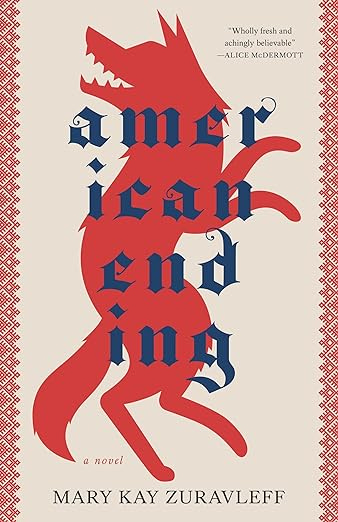
American Ending, set largely in the coal mining town of Marianna, PA and also in Erie, opens in 1908 with the outspoken, captivating voice of 9-year-old Yelena, the first in her family of Russian immigrants born in America and sinfully proud of this distinction. We witness the immigrant experience of this Russian Orthodox family of Old Believers as they struggle to survive and learn what it is to live in their new land. Family is at the center of life, and Yelena, the smartest of the half dozen children, lives with the folk traditions and guides the reader through mine disasters, early marriages, assaults, escapes and ultimately a kind of victory as she chooses between an “American” or a “Russian” ending, and comes to see she must navigate her own ending. Along the way Yelena and her community meet U.S. President Theodore Roosevelt, who makes a cameo appearance, but one with significant impact on the tale and eventually on Yelena’s sense of herself and country.
“…Roosevelt, who waved and grinned, wide teeth in his wide mouth, round spectacles on his huge round head. He was fatter than in photographs, as fat as in the funnies. ‘He doesn’t look like a lame duck. He looks like a walrus,’ Kostia whispered….
“Miners in starched collars were there to ride with him to the tunnels and back, but the president waved them off, including Paddy Hanrahan’s da, not even bothering with the two-bit tour…. ‘Colliers, all, I greet you,’ his reedy voice sang out. I wondered if the miners knew they were colliers. He threw his arms wide in amazement. ‘This modern mine is the envy of the world—you unearth more soft coal in an hour than others do in a day.’…
“While he knew how much the mine produced, did he know how an explosion rumbles along a seam, raining chunks of coal? Had he gotten a whiff of the afterdamp that suffocated men…
“I held up my hand… ‘Mr. President, over here!’”
Not long after Roosevelt’s historic visit to Marianna, there was in fact a major cave-in that devastated the community and only at the end do we learn of the more profound impact of Roosevelt policies on Yelena’s sense of identity. American Ending shares with the reader the perils and challenges of everyday life for immigrants at the turn of the last century and also the triumphs rendered through Yelena’s indomitable voice.

Michael Zagst’s The American Falls rifts off an historical camping trip of Thomas Edison, Henry Ford, Harvey Firestone, and President Warren Harding in 1923 with the fictional character of Sidney Martin Halverton coming along at the invitation of Edison. Edison was a world-renowned figure then and the oldest, and probably wisest, of the group. The story is told as a retrospective by Halverton in his later years.
A veteran of World War I, Halverton was a supervisor at the Trenton Canvas Company which produced anything made of canvas, including the tents which the camping trip would use. Because of his war experience, Halverton knew Morse code so when the half-deaf Edison came to inspect the merchandise and couldn’t hear because of the factory noise, Halverton tapped out his message on Edison’s wrist using Morse code. Impressed by the young engineer, Edison invited him and his soon-to-be new girlfriend to join the camping trip
And so the story is set up. By the time the plot accelerates with the kidnapping of President Harding, the reader has met and has sympathy for the characters and issues of the day, which include the real sudden death of Harding later that year, though not because of the fictional kidnapping.
The American Falls spins its story in a particular period of history with four giants of the time, though the author has since noted that if he were to rewrite it today, he might have noted more flaws in the characters.
At the end, the narrator notes: “Perhaps 1923, like Autumn, signaled the end of something in me, and the natural change of the seasons reminds me of those times. Who is to say exactly what happened then? So much time has passed that there is bound to be a distortion. A distortion of memory already dependent on the powers of recollection of three people. In that broken country house long ago, Harding related his side of the events to Edison. In Niagara Falls, Edison relayed the message to me. Now there are all the years for the story to be filtered though. Who is to say?”
While in London this summer I visited several settings from my latest novel Burning Distance and thought I would continue to share these with you along with passages from the book.
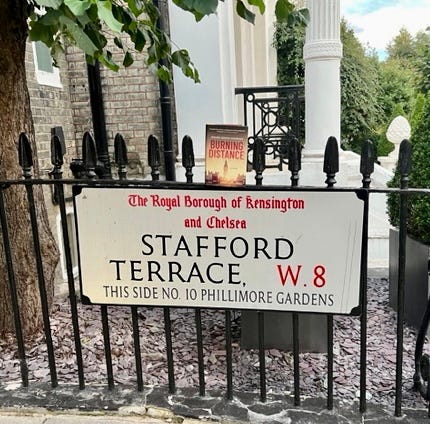
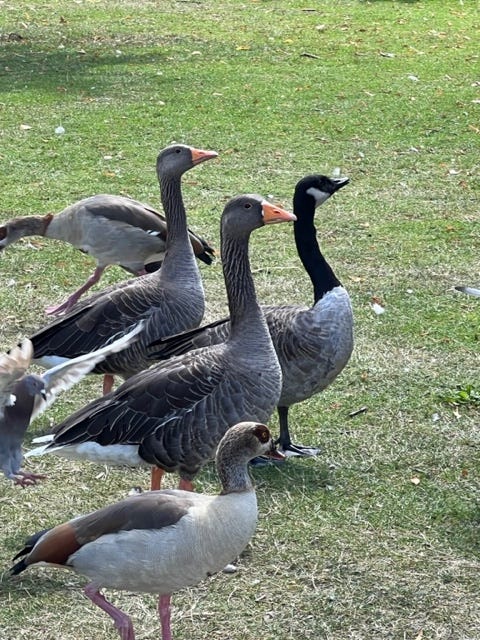
(Over the years I’ve accumulated a running list of words I haven’t known from two main sources: WordDaily and WordGenius)
Tohubohu
[tōho͞oˈbōho͞o]
Part of speech: noun
1. A state of chaos; utter confusion.
Examples:
“The mayor’s sudden resignation left the city council in a tohubohu.”
“After a long weekend, the students were always in a tohubohu.”
“My closet is in a tohubohu, and I can’t do any shopping until I clear it out.”
Froideur
[froi deur]
Part of speech: noun
1. Coolness or reserve between people.
Examples:
“There was a distinct froideur between the colleagues, but it seemed to be a focus on professionalism rather than any kind of animosity.”
“To avoid any froideur between my friends and new boyfriend, I planned a get-to-know-you brunch.”
“There's always been a bit of froideur between my sister-in-law and my sister, but I hope it will ease over time.”
Muliebrity
[myoo-lee-EB-ri-tee]
Part of speech: noun
1. Womanly qualities; womanhood.
Examples:
“Women express muliebrity in many different ways, ranging from motherhood to paths at home, in the workplace, and in the public sphere.”
“Eileen felt most at home in her muliebrity when she became a grandmother.”
I’ve enjoyed giving readings at bookstores, addressing audiences in many venues, and moderating discussions around the world, speaking on a wide range of topics.
In November I’m looking forward to talking about Burning Distance at a book club, university class and PEN/Faulkner literary luncheon, which readers can attend November 16 by joining PEN Faulkner Founding Friends.
Click here for a list of future and past public events.
Or fill out the speaking request form to schedule an event.
I enjoy engaging with readers. If you are in a Reading Group or Book Club and read one of my books, I'd be glad to be in touch by email, zoom, or when possible in person. I can also suggest discussion topics.
Fill out the reading group form here to schedule a meeting.







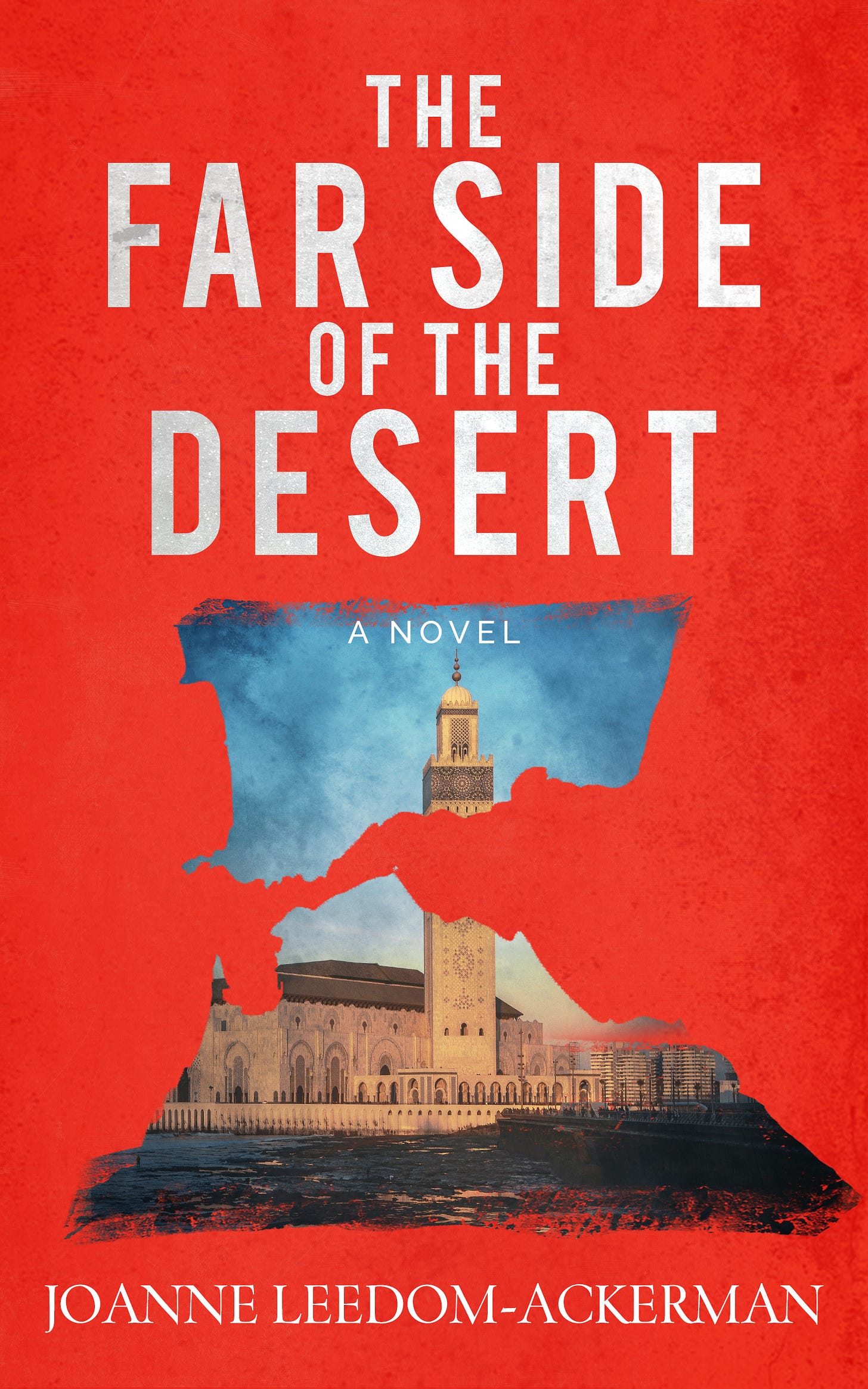
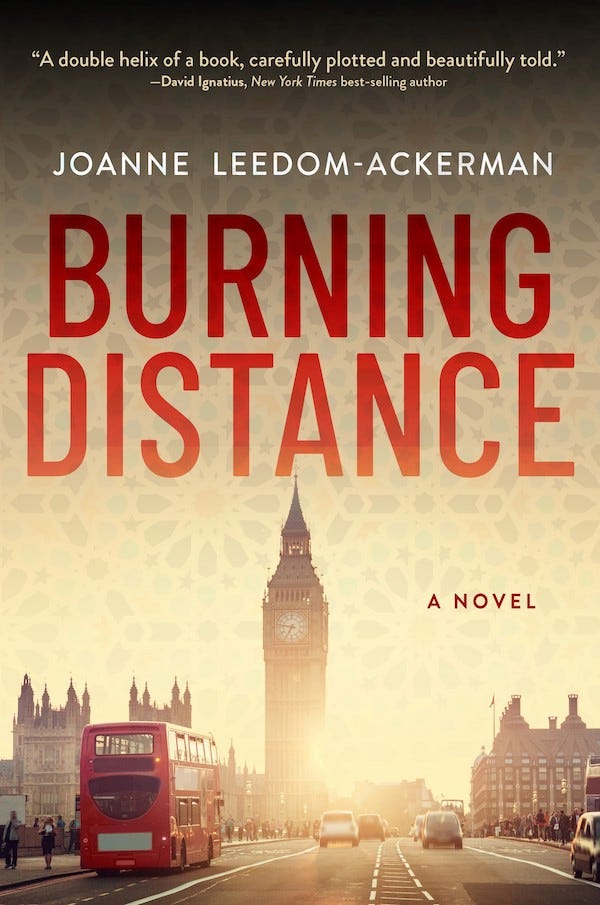




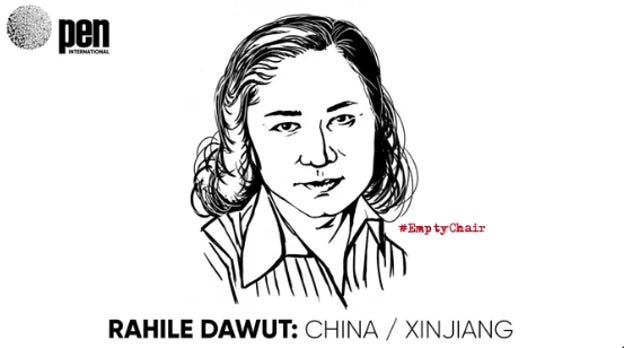
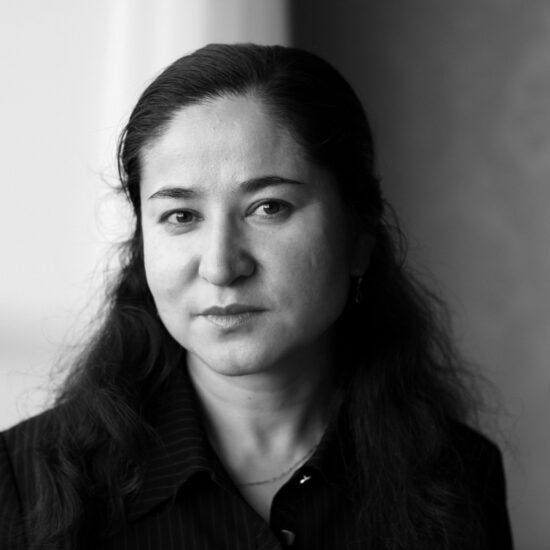





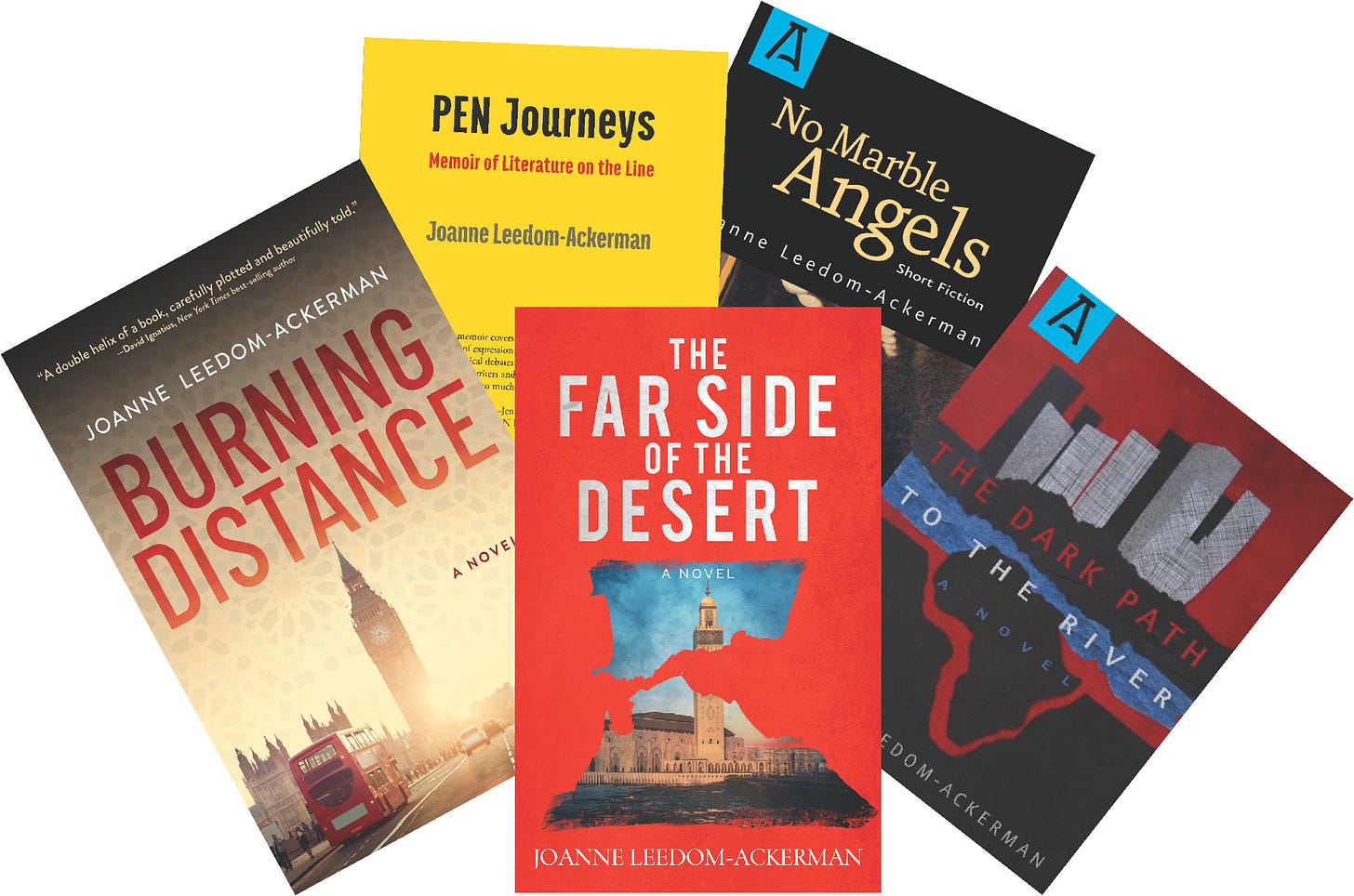
Joanne, thank you for laying out your thoughts and thread of reasoning for how to be constructive in engaging in the challenging events of the day. Somehow redirecting our focus to a baseline of gratitude and thanksgiving almost always gives us a good start.
Joanne, Many thanks for your reflections on how to confront the conflicts that seem so all-encompassing the world. Hope may not be a strategy but it certainly is a beginning if we are sincere in our efforts to find answers.